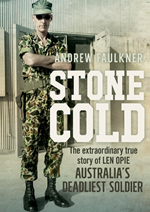The cover image of Stone Cold suggests that this is a story about an Australian soldier who fought in South Vietnam, but Len Opie carved a reputation as one of the country’s fiercest infantrymen through three wars across 30 years. From the jungles of New Guinea and Borneo during World War II, through Korea and then in South Vietnam, Len Opie served in a remarkable number of Australia’s wars and battles.
First enlisting in 1942 at age 19, Opie saw operational service in Nadzab, Lae, the Markam and Ramu Valleys, Morotai and Balikpapan. Enlisting again in 1950 he served with the 3rd Battalion, Royal Australian Regiment (3 RAR), and participated with distinction in the battles of Kapyong and Maryan San. He returned to Korea for a second tour of duty in 1952 and was awarded the Distinguished Conduct Medal by Her Majesty the Queen in 1954. Opie joined the Citizen Military Forces and was commissioned in 1958. In 1964 he was promoted to Captain and in 1966/67 served with the Australian Army Training Team Vietnam. In 1968 he was posted to the United Nations Military Observer Group India and Pakistan where he served in Kashmir as a military observer. In 1970 Opie returned for a second tour of duty in South Vietnam.
Opie was a thin, quiet and unassuming man with uncommon valour – he wore 19 medals. He didn’t drink, didn’t smoke, rarely swore and was in no way a womaniser. He was a supreme fighter, be it hand-to-hand or with a .303 rifle, an Owen sub-machinegun, an M1 carbine, a Bren gun, an M16, a sharpened shovel or piano wire … Opie was a master of all weapons. He was a larrikin who went by the book, unless the book was wrong. He railed against martinets and parade ground soldiers. He set his own bar high and expected others to do the same. In all this he was the archetypal Digger. Yet his other traits were at the opposite pole to the Anzac ‘legend’. His chief love was the army, but he also loved trains – a room was devoted to model trains in his parents’ house – and animals. Anyone who mistreated an animal – or mistreated a prisoner – ran the risk of being ‘hexed’ by him.
When asked in 2004 what, if anything, war proved, he said: “Well, we’re right and they’re wrong and you hope that the other side will make more mistakes than you do. That’s really what it amounts to. You don’t win a war, you only lose a war. Nobody ever really wins a war.” Opie had a dry wit and macabre sense of humour. At a dinner party when the conversation turned to the 1972 Andes airline crash survivors who turned to cannibalism, a female guest pondered: “I wonder what human flesh tastes like?” “Salty,” Opie said. When recruits newly arrived in Vietnam said they had heard the Australians cut off their enemies’ ears to verify kills, Opie looked up from his dinner to say: “Well, you don’t expect us to lug their heads around in the jungle, do you?”
At age 80 Opie wrote to the Army volunteering to be sent to Afghanistan. The closest he got was giving a speech to 7 RAR when it departed Australia in 2008. Addressing a new generation of Diggers, Opie spoke of duty, regardless of the consequences. He spoke of honour. He said death was part of the game. Len Opie died soon after giving this address – he was 84. Riderless horse, gun carriage, rifle volley … Opie’s full military funeral was a grand show. The Centennial Park chapel in Adelaide was brimming with brass and festooned with campaign ribbons. Keith Payne, VC, said the nation had lost “a warrior soldier … a soldier above soldiers … The amount of training Len put into keeping other people alive and the example he set for the youngest generation of soldiers was outstanding.” In his eulogy, Brigadier Laurie Lewis described Opie as a “man of Sparta”.
Opie produced copious records of his army life; voluminous albums, an extensive library, diaries, newspaper clippings, army documents … his life in fragments. Andrew Faulkner was granted exclusive access to Opie’s copious diaries and has interviewed many of his comrades for this book. It adds up to a grand tale. Stone Cold includes a good number of black and white photos, several clear black and white maps, detailed end notes, a bibliography and a useful index.
Action-packed and surprising, Stone Cold gives rich life to an extraordinary warrior and one of Australia’s greatest soldiers. It is highly recommended.

Contact Marcus Fielding about this article.






